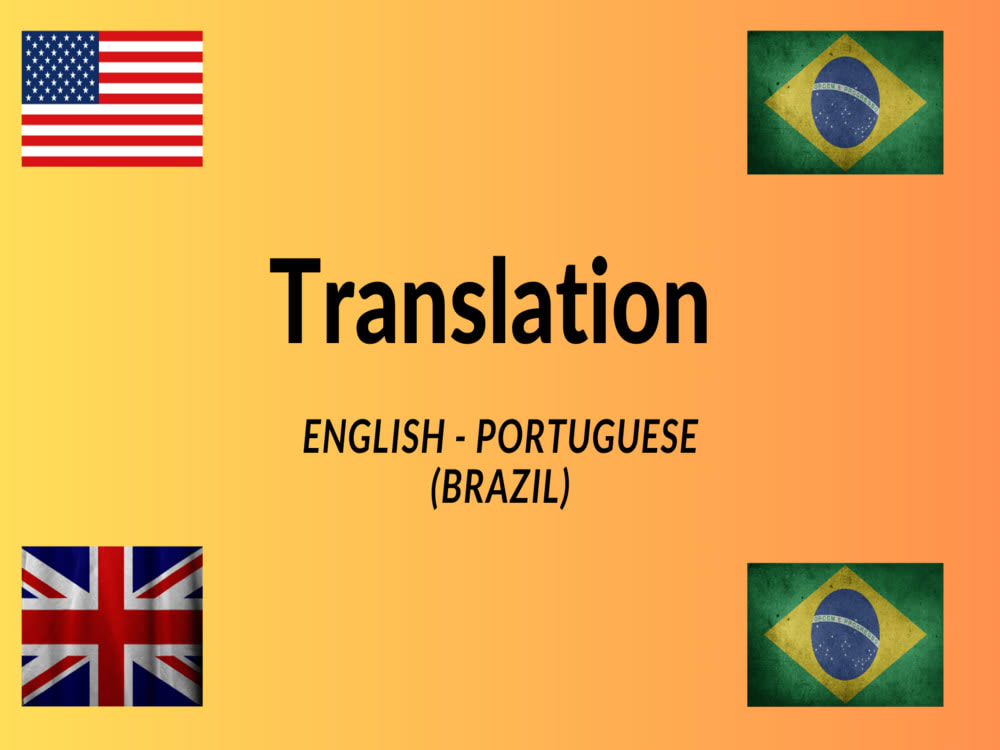Top Tips for Perfect English to Portuguese Translation Provider
Achieving outstanding English to Portuguese translation requires more than plain word-for-word conversion; it requires an understanding of cultural nuances and etymological ins and outs. Selecting qualified translators that are both fluent and culturally mindful is critical - English To Portuguese Translation. What other essential variables should be taken into consideration to raise translation quality better?
Understand Cultural Nuances
When equating from English to Portuguese, realizing the social nuances is essential for generating a precise and resonant message. The Portuguese-speaking world varies, incorporating numerous areas, each with its distinct customs, idioms, and social standards. A translator needs to be attuned to these subtleties to guarantee that the translation not just communicates the desired message however additionally resonates with the target market.
For example, colloquial expressions in English may not have straight counterparts in Portuguese. An expression that works well in one society could bring about confusion or false impression in one more. Comprehending local dialects and variants, such as those found in Brazil and Portugal, is vital; words might hold various connotations or uses depending on the place.
In addition, social context plays a considerable duty in translation. Consideration of historical, social, and political aspects can influence language selections and tone. This cultural understanding permits the adjustment of content that aligns with regional worths and assumptions, thereby boosting the performance of communication. Eventually, an extensive understanding of social subtleties is vital for delivering translations that are not only linguistically accurate but also culturally appropriate and appealing.
Select Certified Translators
Selecting qualified translators is a vital action in making sure the precision and quality of English to Portuguese translations. A translator's knowledge not only encompasses language proficiency but also a deep understanding of cultural context, idiomatic expressions, and industry-specific terminology. When selecting a translator, prioritize those with formal training in translation studies or grammars, along with pertinent accreditations that demonstrate their expert capability.
Experience plays a crucial duty also; translators focusing on particular areas-- such as lawful, clinical, or technological-- are more probable to deliver specific translations tailored to the industry's criteria (English To Portuguese Translation). Furthermore, consider their portfolio and customer testimonies to analyze their previous job high quality and reliability
Engage translators that are native Portuguese speakers, as they have an innate understanding of the language's subtleties and local dialects. This knowledge improves the translation's authenticity and effectiveness.
Usage Contextual Recommendations

When converting, it is vital to identify idiomatic expressions and social references that might not have straight equivalents in Portuguese. For circumstances, specific phrases that resonate in English may require adaptation to share the exact same psychological weight or cultural relevance in Portuguese. Employing contextual references can assist translators pick the right terms and design, consequently enhancing the general clearness and influence of the translation.

Emphasis on Localization
Localization plays an essential role in the translation process from English to Portuguese, as it makes certain that the converted web content is pertinent and culturally ideal to the target market. English To Portuguese Translation. This process goes beyond mere translation; it entails adjusting the material to the cultural, social, and linguistic nuances certain to Portuguese-speaking areas
Comprehending local idioms, customs, and choices is important. As an example, specific phrases or referrals that reverberate with an English-speaking audience might not have the very same effect on Portuguese audio speakers. It is vital to take into consideration local variations, such as Brazilian Portuguese versus European Portuguese, as each has distinct vocabulary and stylistic distinctions.
Additionally, localization incorporates formatting, such as day and time styles, currency, and measurement units, which can differ significantly throughout cultures. This interest to information fosters a connection with the audience, improving interaction and understanding.
In addition, employing regional languages and jargon can give authenticity, making the web content much more relatable. By concentrating on localization in English to Portuguese translation, businesses can efficiently connect their message, develop trust with their audience, and inevitably attain their intended goals.
Evaluation and Edit Extensively
Detailed evaluation and editing and enhancing are vital steps in the translation process, specifically when transforming English web content right into Portuguese. This phase makes sure that the converted product not only keeps the initial significance yet additionally reverberates well with the target market. Given the social and etymological subtleties, a meticulous method to examine and editing and enhancing is essential.
Begin by comparing the original English text with the Portuguese translation, paying attention to terminology, tone, and context. It's vital to make sure that idiomatic expressions and social referrals are appropriately adjusted for the Portuguese target market. Involving a second translator or an indigenous audio speaker for this testimonial procedure can supply very useful understandings and capture errors that might have been forgotten.
In addition, look for grammatical accuracy and stylistic uniformity throughout the record. Common challenges such as false cognates or unclear expressions must be dealt with to avoid misinterpretation.
Conclusion
Attaining remarkable English to Portuguese translation services demands a comprehensive approach that incorporates understanding social nuances, picking qualified translators, utilizing contextual recommendations, prioritizing localization, and conducting detailed evaluations and edits. Each element plays an important duty in guaranteeing that translations are not only precise but also reverberate with the target market. By executing these strategies, companies can enhance the performance of their communication and cultivate a website link much deeper connection with Portuguese-speaking target markets.
Accomplishing remarkable English to Portuguese translation calls for more than plain word-for-word conversion; it demands an understanding of social nuances and etymological complexities.Choosing certified translators is an essential step in making certain the accuracy and high quality of English to Portuguese translations.Comprehensive review and editing and enhancing are important actions in the translation procedure, particularly when converting English web content right into Portuguese.Begin by comparing the original English message with the Portuguese translation, paying close focus to context, terminology, and tone.Achieving phenomenal English to Portuguese translation services necessitates a detailed strategy that incorporates understanding cultural nuances, choosing certified translators, making use of contextual referrals, prioritizing localization, and carrying out comprehensive testimonials and edits.
Comments on “Economical and Reliable English To Portuguese Translation Solutions”